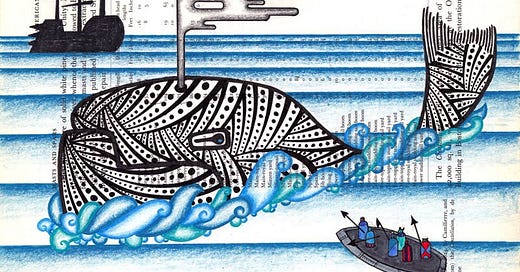Maybe this is something that happens when you reach a certain age. But I find that I am thinking about regrets more than I used to. Luckily, I don’t have that many from my youth. Maybe because I flung myself, Ishmael-style, into the world while still so young, I always followed my dreams back then. I still try to do that now too…. mainly because I don’t want to have too many regrets in life.
And there is that old saying that most people regret the things they didn’t do. In Japan, of course, I regret not seeing Okinawa and Hokkaido. I was there two decades and most of Japan was left unseen. But that said, I have very few regrets for things I did do. One is I wish I had never eaten whale.
It was only a bite, but I still regret it.
Trying not to make waves in consensus society Japan, I took a bite of whale at a drinking party when I was working as an Office Lady at Hitachi Logistics in downtown Tokyo. The company HQ was located in the famous Tsujiki Fish market district —and we ate all kinds of fish when we went out.
I have loved whales all my life. My first committed social cause was Save the Whales. I was a child—maybe ten or eleven years ago when I joined the campaign using my Christmas money to make my first donation. It was something I kept up till college. Those were in the days when whales were “popular.” Roger S Payne made his famous discovery about humpback whale song and created a CD of their music in 1970; later talking National Geographic Magazine into including a disc of their music in an issue of the magazine that went out to 10.5 million subscribers in 1979. This album not only inspired songs by Pete Seeger, Judy Collins, and Kate Bush, but whale song also was launched into space aboard Voyager in 1977.
Everyone seemed to be as excited about whales as I was. And of all the issues in the world, I would have thought we could have solved that one—since we no longer needed them for oil, right? How is it possible they are still endangered?
Japan is one of the few places in the world that has kept whaling. It became a seafaring nation during the Edo period and whaling was practiced as part of that. I have never been to a whaling community, but I have read about shrines with huge bleached-white whale bones used as torii gates.
I have long-loved this poem by Misuzu Kaneko (died 1930) called “Whale Memorial.” It’s about the religious rites that were once carried out (maybe still carried out?) by whaling communities in Japan to honor the dead souls of whales:
鯨法会は春のくれ、
海に飛魚採れるころ。
浜のお寺で鳴る鐘が、
ゆれて水面をわたるとき、
村の漁師が羽織着て、
浜のお寺へいそぐとき、
沖で鯨の子がひとり、
その鳴る鐘をききながら、
死んだ父さま、母さまを、
こいし、こいしと泣いてます。
海のおもてを、鐘の音は、
海のどこまで、ひびくやら。
Whale memorials are held in spring/around the time flying fish are caught in the sea/when bells toll from the temple on the beach/ringing across the water’s surface/when fishermen dressed in haori coats hurry to the temple/ an orphaned whale calf cries in the water listening to the sound of the tolling bell/Weeping for its dead mother and father/And I wonder how far the sound of the bell will travel/across the sea?
In one of the best books I read two years ago Floating Coast: An Environmental History of the Bering Strait, Bathsheba Demuth describes similar traditions of whale memorials held in the indigenous communities of Alaska, where the spirit of the dead whale is honored in prayer.
Demuth in her book asks whether there isn’t a meaningful moral difference between traditional methods of hunting versus the industrialized food of today. Sustenance versus profit. Sustainable versus greed. When these differences are overlooked, we really get into murky water.
This is not to say that being a vegan is not a better choice—just to remind people that there are also meaningful choices for meat-eaters.
To be alive means taking up our place in a chain of conversions,” Demuth writes in Floating Coast. “In order to live, something, some being, is always dying.” After centuries of humans’ industrial energy consumption, what will be next to go? This summer, Alaska had its hottest days ever recorded. Seas rising, habitats disappearing, extreme weather events on the rise. As people act, the climate reacts. Only by understanding that link might we survive, she warns.
Please see the full essay on Monday at 3 Quarks Daily.
For more:
Floating Coast: An Environmental History of the Bering Strait, by Bathsheba Demuth
More about Kaneko’s whale poem (with a different translation of her poem) by Shaun O’Dwyer in the Japan Times
A natural history of Moby-Dick: Ahab’s Rolling Sea by Richard J. King
How to Speak Whale, by Tom Mustill
Image from Moby Dick in Pictures by Matt Kish





Astounding creatures! I look forward to your essay. FWIW I grew up knowing about whaling, and its history was always presently straightforwardly, without judgement on the past. Something necessary about respecting how our forebears lived in touch with nature in a way we'll never comprehend.